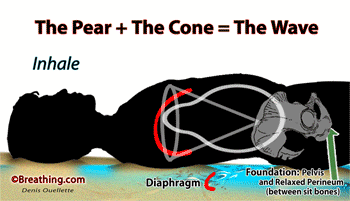Benefits of Optimal Breathing
Breathing is the very essence of life, an omnipresent force that keeps us tethered to this world. It is the silent conductor of vitality that enables us to live, learn, and explore. Yet, how often do we take a moment to consider the power of our breath? How often do we focus on breathing with intention and purpose?
Well, the power of breath goes beyond the mere mechanics of survival, as optimal breathing can elevate our existence to new heights, fostering physical, emotional, and spiritual well-being.

What Does an Optimal Breath Look Like?
Breathing optimally involves your belly (diaphragm in particular), ribs, chest, and shoulders in the form of a wave that is moving in the upward direction.

From the image, you can see the pear, cone, and diaphragm (represented by the red line) in action.
During the breathing cycle, the rib cage and diaphragm work in tandem to facilitate the exchange of air. On the inhale, the diaphragm contracts, flattens, and moves downward, and the rib cage expands.
When you exhale, the diaphragm relaxes and returns to its high dome shape, pushing air out of the lungs while simultaneously massaging the heart. In addition, the collapsing of the rib cage also contributes to the expulsion of air during exhalation.
Here are just a few of the ways healthy breathing benefits your body systems:
| Respiratory System | -- Helps relieve long-term respiratory conditions, including COPD, Asthma, and Bronchitis -- Improves lung capacity and oxygenation of the blood -- Reduces the risk of respiratory infections and disorders -- Reduces chest pains -- Improves respiratory muscle strength and endurance |
| Cardiovascular System | -- Lowers blood pressure and heart rate -- Enhances blood flow -- Improves heart function -- Eases the strain on the heart -- Increases oxygen flow to vital organs |
| Nervous System | -- Calms the fight-or-flight response and reduces stress and anxiety -- Boosts focus, concentration, and mental clarity -- Regulates the autonomic nervous system and promotes the relaxation response |
| Immune System | -- Enhances immune function and reduces inflammation -- Boosts natural killer cell activity and antibody production -- Reduces the risk of infectious and autoimmune diseases |
| Digestive System | -- Improves digestion and absorption of nutrients -- Reduces symptoms of irritable bowel syndrome (IBS) and acid reflux -- Enhances gut microbiome and immune function |
| Urinary System | -- Helps eliminate excess fluids -- Reduces edema -- Decreases stress on organs of elimination, helping the body to naturally cleanse and tone. |
| Lymphatic System | -- Moves lymphatic fluid through your system, which in turn assists in the elimination of toxins and provides benefits for those with lymphedema (swelling due to lymph build-up). |
| Musculoskeletal System | -- Enhances postural alignment and balance -- Improves flexibility, range of motion, and coordination -- Good diaphragm movement helps the flow of spinal fluid along the spine. The diaphragm wraps around the spine and this up-and-down movement during optimal breathing is the ONLY pump for the spinal fluid. -- Reduces the risk of musculoskeletal injuries and disorders |
| Endocrine System | -- Balances hormones and reduces cortisol levels -- Improves insulin sensitivity and glucose metabolism -- Reduces the risk of metabolic disorders such as diabetes and obesity |
Re-learning to Breathe
Here are some other benefits of re-learning to breathe the right way:
Psychological Aspects
Enhances concentration, focus, and observation
Helps you become more grounded and centered
Cultivates present-moment awareness
Lower stress levels result in better productivity, higher learning ability, and improved decision-making capabilities
Emotional Aspects
Improves feelings of safety, nurturing, self-acceptance, and sense of relaxation and inner peace
Helps overcome self-defeating habits and patterns, including those rooted in childhood traumas, religious programming, and cultural conditioning
Bolsters the ability to cope with stressors and challenges.
Fosters a greater sense of self-worth and inner strength
Promotes increased self-awareness and self-love, leading to healthier lifestyle choices.
Spiritual Aspects
Facilitates deeper meditation and strengthens spiritual connection
Increases intuition
Helps balance subtle energy systems in the physical, emotional, mental, and spiritual bodies
Improves creative thinking
Interpersonal Relationships
Increased relaxation, self-love, and self-acceptance can lead to greater empathy and compassion towards others.
Helps clarify and reinforce personal boundaries and encourages individuals to take responsibility for their actions within relationships
Enhances awareness and management of subtle energies within and around oneself and others, potentially leading to more harmonious interactions
When we learn to harness the power of our breath, we unlock a wellspring of vitality and resilience, empowering us to meet life's challenges with grace and ease.
With its advanced and versatile approach, the Optimal Breathing Mastery Kit is a game-changer for anyone looking to improve their breathing and experience the many benefits that come with it.
This is the most comprehensive breath-improvement program that exists, the culmination of the life’s work of Michael Grant White, founder of OptimalBreathing.com.
Take a deep breath now, and let the benefits of healthy breathing transform your life.



